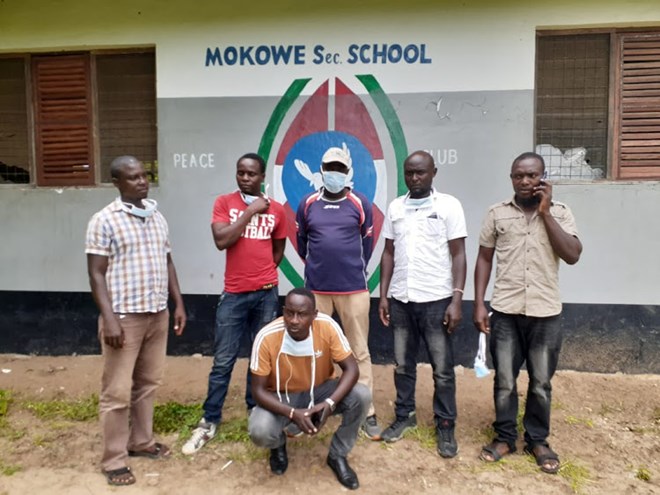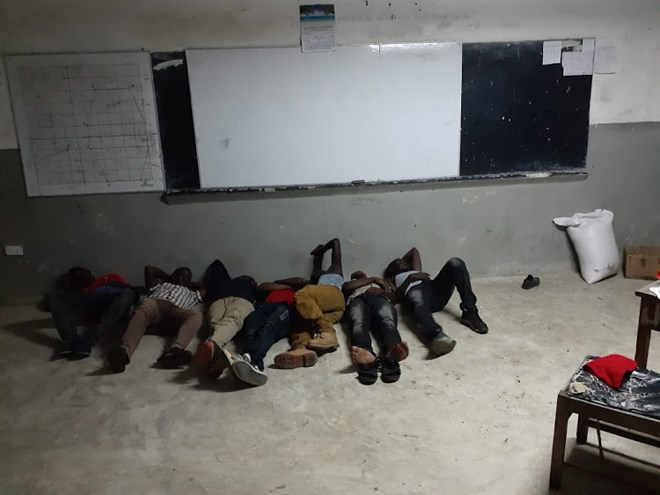
Thursday June 18, 2020
BACK HOME: Six of the seven Kenyans who were stranded in Ras Kamboni, Somalia, after returning to Kenya where they were housed at Mokowe Secondary School in Lamu on Tuesday, June 16, 2020.Image: BRIAN OTIENO
The seven Kenyans who were stranded at Ras Kamboni in Somalia have finally walked back to Kenya after a long wait for help that never came.
On Monday, they walked for more than two hours from Ras Kamboni to Shakani in Kenya, where they met a man who turned out to be a Nyumba Kumi ambassador.
The man took them to a GSU camp in the area where they were fed, interrogated and presented to the KDF, who also interrogated them and had them spend the night at the camp.
Around 9.30am on Tuesday, they were flown in a military chopper to Mokowe, where they were received by regional administrators and Muslims for Human Rights officials, who have been championing their return home.
The others are Ignus Kialu, Patrick Shighula, Michael Mjala, Gabriel Kennedy Otieno, Elia Mwalili, and Abbas Mutuku. They were taken to Somalia by an engineering company for a welding job.
However, there was a disagreement with their employers and were left stranded before flights were grounded because of the coronavirus pandemic.
Lamu county commissioner Irungu Macharia on Wednesday told the Star the seven were still being processed before they could be released.
“They are in Kenya now and we are sorting their case out,” Macharia said.
He said the matter borders on national security and care must be taken.
“We have to be thorough. They are in quarantine,” he said.
Muhuri evaluation, monitoring and communication officer Ernest Cornel said the organisation has been financially sustaining the seven while in Somalia and their families back home.
“We are elated they are finally back home though they had to force their way in. However, we are very concerned with the government response to their predicament.”
He said this showed open bias against the seven given that those who had been stranded in countries such as India, the UK and China were given first-class treatment, yet the seven were just across the border and they had to walk back to Kenya.
“For them to reach the decision to walk, they had been blocked from entry into Kenya by the authorities. It took a lot of courage to make that decision,” said Cornel, who is also a certified professional mediator.

The seven returnees in a classroom at Mokowe Secondary School on Monday evening.Image: BRIAN OTIENO
Mwaghazi said projectiles were frequently hurled at them by Somalians who branded them coronavirus carriers. On Sunday, just a day before leaving, they had contacted the Somali National Army asking them for their passports and a boat they could use to get to Kiunga.
They only got their passports back. The boat never came through. Instead, they were given a Kenyan number to call.
“The number turned out to be that of one Kenyan government official who said we cannot get a boat and that we should go back to Mogadishu,” Mwaghazi said.
They decided to walk along the Indian Ocean shoreline till they reached the Kenyan land.
“We had been seeing masts whenever we went to a raised ground to make phone calls. So we decided we would walk in the direction of the masts from 5am on Monday,” Mwaghazi said.
He said they were given a sack of rice and cooking oil, which is what they would be eating while in quarantine.
“But we are like travellers. We have nothing else with us apart from our clothes. What are we going to cook this rice with? We do not even have a matchbox,” Mwaghazi said.
Muhuri chair Khelf Khalifa on Tuesday wrote to Macharia lamenting the condition of the Mokowe Secondary School as a quarantine facility.
“The school lacks bed and bedding. It has no cooks to offer meals for the group. It is not the responsibility of the seven to cook for themselves as you had demanded,” Khalifa said in the letter addressed to Macharia.
He said the national and county governments cannot abdicate their responsibility to protect the returnees.
“We are, therefore, demanding that you provide an alternative quarantine centre for the seven that is secure, has a proper shelter, beds, bedding, and food, and which is accessible to medical personnel,” the Muhuri chair said.
If it that cannot be done, then the seven should be transferred to Mombasa where the desired facilities are available, he said.